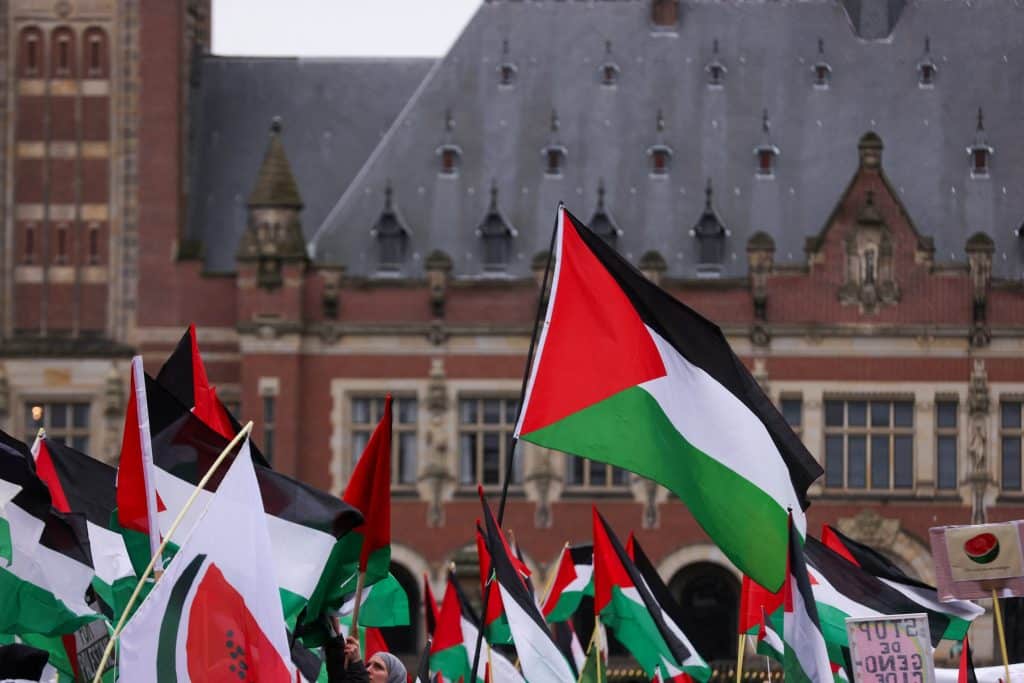Over a 100 days into a bloody campaign in which over 23,000 Gazans have been killed, over 10,000 of whom are children, and millions displaced, Israel was taken to court for committing genocide this week at the International Court of Justice (ICJ) in The Hague. In a case brought forward by South Africa to the United Nations’ highest judicial body, Israel stood accused of the intent to create “conditions of death” in Gaza. Israel’s actions in Gaza have, according to South Africa’s complaint, directly violated the Genocide Convention.
A Damning Picture of Israel’s Destruction of Gaza
In a packed courtroom in The Hague, lawyers from South Africa presented their case on Thursday. They showed the horror that Israel has rained down on Gaza through its brutal siege, denying Palestinians in the strip essential supplies like food, water, and medicine, and the unprecedented violence on thousands of Palestinians, an overwhelming number of whom are children. They also used the words of Israeli officials — including those of Defense Minister Yoav Gallant, who said in October that Israel would impose a complete siege on Gaza because it was fighting “human animals” — to paint a singular picture of genocidal intent. As South African lawyer Adila Hassim noted in her opening remarks, “Israel has subjected Gaza to what has been described as one of the heaviest conventional bombing campaigns in the history of modern warfare.” She further noted, “Palestinians in Gaza are being killed by Israeli weaponry and bombs from air, land and sea. They are also at immediate risk of death from starvation and disease, due to the destruction of Palestinians towns, the limited aid being allowed in, and the impossibility of distributing aid as the bombs fall. This makes life impossible.”
In speaking of the State of Israel’s genocidal intent, Tembeka Ngcukaitobi, an advocate of the High Court of South Africa, quoted members of the Israeli government who have, through statements and interviews, made clear their violent ambitions. Among them, Ngcukaitobi declared, “the intent to destroy Gaza has been nurtured at the highest level of state,” and Israel’s political and military leaders, including Prime Minister Benjamin Netanyahu, are among “the genocidal inciters.”
In perhaps the most damning testimony on Thursday, Irish lawyer Blinne Ní Ghrálaigh KC described Israel’s attacks as “the first genocide in history where its victims are broadcasting their own destruction in real-time in the desperate — so far vain — hope that the world might do something.” Ní Ghrálaigh further asserted, “This is a population that Israel had already made vulnerable through 16 years of military blockade and crippling ‘de-development.”
Israel’s Defense
In response, the Israeli Foreign Ministry accused South Africa of serving as the “legal arm of Hamas.” Netanyahu further claimed that Thursday’s testimonies represented an “upside-down world,” where “Israel is accused of genocide at a time when it is fighting against genocide.”
Through Friday, Israel’s defense case repeated the same claims of “self-defense” after Hamas’s attacks on October 7 to justify the destruction of Gaza and refute the claims of “genocidal intent.” Christopher Staker, a lawyer representing Israel, claimed that “the inevitable fatalities and human suffering of any conflict is not of itself a pattern of conduct that plausibly shows genocidal intent.” Given the relative weakness of the legal arguments against genocide, Israel’s defense tried to limit the arguments to questions of procedural and jurisdictional viability.
Israel’s lawyers argued that its military complied with international law and that it aimed to mitigate civilian harm by warning of military attacks and ordering evacuations through leafleting and telephone calls. They also argued that Israel has played a role in “facilitating” humanitarian aid to reach Gaza. Israel’s acting director of the international justice division at the Israeli Ministry of Justice, Galit Raguan, also rejected the claim that Israel had bombed hospitals, arguing that Israel had evidence of Hamas using “every single hospital in Gaza” for military purposes, while Israel’s representative Tal Becker repeated claims of Hamas’s “embedding its military operations throughout Gaza within and beneath.”
Yet reality has shown us the opposite. Many of Israel’s most outlandish claims, such as that Hamas uses civilians as shields and hospitals as military operation centers, have been shown to be either fabricated or grotesquely overexaggerated. And while Israel feigns concern for civilian lives, it has ruthlessly razed Gaza to the ground. As Ní Ghrálaigh pointed out in her testimony, the genocide of Palestinians is “being livestreamed from Gaza to our mobile phones, computers, and television screens.” And the images of destruction have been devastating, as the Israeli military has rained destruction on not only the areas it supposedly “declared,” but also safe zones, evacuation routes, shelters and hospitals.
About 1.9 million people, or over 85 percent of Gaza’s population, have been displaced. One in 100 Gazans is dead, and many more are injured, a significant portion of whom are children. Two-thirds of structures across the territory have been destroyed; 23 of 36 hospitals had been rendered inoperable by early January; and there remains only 7 percent of the prewar water supply.
What Do the ICJ Proceedings Mean for Palestine?
In its 84-page court filing, South Africa has accused Israel of genocide and has asked the ICJ to use “provisional measures” — essentially an emergency order — to stop the massacre of Palestinians, including demanding that Israel “immediately suspend its military operations in and against Gaza” and “take all reasonable measures” to prevent genocide. While the court is expected to rule on the possible emergency measures, or even on whether it has jurisdiction here, later this month, it is going to take much longer, likely even years, to rule on the genocide allegations. Furthermore, while the ICJ’s decisions are final and without appeal, the court has no way to enforce them.
Israel’s ability to continue its violent campaign in Palestine has little to do with “legality” or even popular and diplomatic support, and everything to do with the settler colonial aims of the Zionist project, which keeps advancing in the region with the unequivocal support from the imperialist powers. Set up with the help of British and U.S. imperialism to promote their interests in the region, the State of Israel has long been a strategic ally for its imperialist partners in the Middle East, enjoying billions in aid — much of which has been used to expand the occupation. Now, despite waning popular support for its campaign in Gaza, Israel has counted on the continued support of its long-term allies, particularly the United States, to continue its offensive.
Since the beginning of Israel’s assault in October, the U.S. has stood steadfastly behind Israel’s claims of “self-defense.” The U.S. has not only given Israel military backing, but it has also given blanket diplomatic support in the UN, using its veto power against any calls for a ceasefire or condemnation of Israel in the diplomatic body. Despite the overwhelming evidence that Israel has destroyed Gaza, the Biden administration continues to dismiss South Africa’s allegations of genocide as “meritless.” Furthermore, as U.S. Secretary of State Anthony Blinken said, the ICJ case “distracts the world” from the task of securing hostages and promoting “security.”
Beyond the practical limitations of the Court, it is Israel’s partnership with U.S. imperialism, forged and strengthened for over seven decades, that allows the Zionist state to act with impunity. While some allies like the UK, Germany, and France have called for “humanitarian pauses” or “sustainable ceasefires” from some allies, these have largely been empty symbolism, especially as they’ve cracked down on pro-Palestine protests and continue to conflate anti-Zionism with antisemitism. Indeed, even as the crimes of Israel were being presented at The Hague, the U.S. was leading a coalition of 20 countries, including the UK and France, in a bombing campaign on Yemen in retaliation against the Houthis for attacking the Red Sea shipping lanes in response to Israel’s war on Gaza, and threatening to extend Israel’s war beyond Gaza.
The current case isn’t even the first time the Zionist state has been indicted at the ICJ. Just last September, the ICJ concluded “on reasonable grounds that the continuing violation by Israel of the right of the Palestinian people to self-determination is unlawful under international law” and that “the occupation of the Palestinian territory by Israel is (now) unlawful under international law owing to its permanence and actions undertaken by Israel to annex parts of the land de jure and de facto.”
Without any real means of containing Israel’s actions, the ICJ can offer little more than political theater between bourgeois powers. Despite the courts, the United States will continue to protect Israel and provide it with military and economic aid to maintain its bastion, even as it uses the same courts to legitimize its own reign of terror across the globe. For South Africa, furthermore, without any material means of imposing itself, this case marks a political opportunity to highlight the relative weakening of U.S. imperialism amid its increasing confrontation with China and larger geopolitical shifts.
Toward an International Solidarity Movement for Gaza
Any victory for South Africa at the ICJ, although significant, would largely be symbolic. Yet, with the support of the Arab League and delegations from across Europe at The Hague for the hearings, as well as significant public interest on social media, the case has highlighted the plight of Gaza and strengthened public support for it. If Israel is found guilty, it will draw yet another line in the sand, making Israel’s atrocities and the complicity of the imperialist powers even clearer to see.
But we should hold no illusions: even if Israel and U.S. imperialism lose prestige, Palestinian liberation will not come through the courts or symbolic rulings, or any appeals of righteousness and goodwill. Diplomatic institutions like the UN have, time and again, shown their inability to impose themselves. At worst, they have been complicit in the atrocities against countless people across the world at the behest of imperialism. While the UN and its affiliate bodies attempt to paint themselves as neutral arbiters of justice, they have, in reality, enshrined U.S. hegemony across the globe. They are hardly the politically independent bodies or harbingers of peace they claim to be.
Against the dead ends of bourgeois institutions which bring no material changes to the lives of Gazans under siege, we need to put our faith in the hundreds of thousands taking to the streets across the world — from the U.S. and UK, to Denmark, Thailand, Lebanon, Egypt, Yemen, and more — in solidarity with the Palestinian people. While imperialist regimes continue to give cover to the apartheid and genocidal nature of Israel, millions have continued to amplify the calls for a ceasefire and an end to the occupation, often at the cost of severe repression and backlash. It is this solidarity and power that we need to rely on, not in the empty posturing of bourgeois political regimes and international tribunals that serve them, and only attempt to deviate and contain our anger. Far before the lawsuits and rulings brought forward any case against the State of Israel, the streets had already charged Israel and their imperialist allies with genocide.
To strike with our full power at the heart of the Zionist state and imperialist institutions that work in tandem, we need to strengthen and expand an international solidarity movement, mobilized where we are strongest — in our workplaces, in our schools, and in the streets — and fight to end Israel’s war and occupation, and for a free, secular, socialist Palestine.











